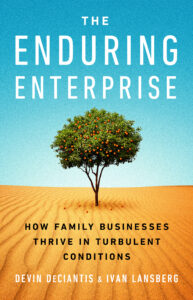The COVID–19 pandemic caught the world’s family businesses, and all businesses, off-guard by its unprecedented nature. But Corporate Strategist, Devin DeCiantis of global family business advisement firm, LGA, believes that even if a family enterprise somehow had a playbook ready for the scope of calamity caused by the coronavirus, executing those strategies amid such a crisis would be extremely challenging. The emotional impact of a major crisis, and the figurative fires that it triggers, has a way of reframing reactions and arresting strategic planning — shifting focus to immediate responses rather than prevention or recovery.
And for family firms with little or no crisis preparation, the difficulty of trying to build structures of crises governance from scratch can be amplified by instinctive behaviour that favours the familiar over better choices of adaptation and delegation.
Whatever the degree of preparation, agility is a key factor that determines how well a family business can mitigate the effects of a crisis, and ideally, implementing a strategy that is just as nimble. Four strategies family business leaders can use to navigate a crisis:
Crisis Governance
Effective coordination and communication are obvious priorities under normal operating conditions, but during a crisis, they become essential as leaders are forced to make difficult trade-offs with scarce resources, competing agendas, and limited time. During a crisis, family firms benefit from a strategy of adaptive oversight that ensures all stakeholders remain aligned around long-term vision, core values, financial expectations, and risk management processes.
Adherence to Values
A family business’s values embody its defining characteristics, guiding and orienting the business in good times and bad. Adhering to values serves as a litmus test for leadership decisions made in the disorienting fog of a crisis – especially difficult choices concerning layoffs and restructuring.
Preparedness
A Family Enterprise Risk Management program systematically tracks probable and improbably risks, allowing family businesses to be better positioned for navigating downturns. But even when adopting a full Risk Management Program can be complicated in the middle of a crisis, organisations can begin documenting their responses, assessing what works well and what doesn’t as it gathers the data that will form a holistic approach to risk management for the next crisis.
Proactive Leadership
Family leaders need to be in control, facing down the challenges of a crisis; not letting those challenges control them. From the C-Suite to the Board, to the Chair of the Family Council, leadership need to be beacons of hope in a sea of uncertainty, proactively charting the company’s path, while underscoring its resiliency. That doesn’t mean being “irrationally exuberant” or a thoughtless cheerleader, but acknowledging the external threats and tough internal decisions in service of a purposeful, longer-term vision for the enterprise and its stakeholders. Hope is a powerful catalyst that leaders can wield proactively.
Devin DeCiantis is a Senior Associate at family enterprise research and consulting firm, Lansberg-Gersick & Associates. His work focuses on the financial, operational, and strategic aspects of family-controlled organizations.
Listen to LGA Lighthouse on











